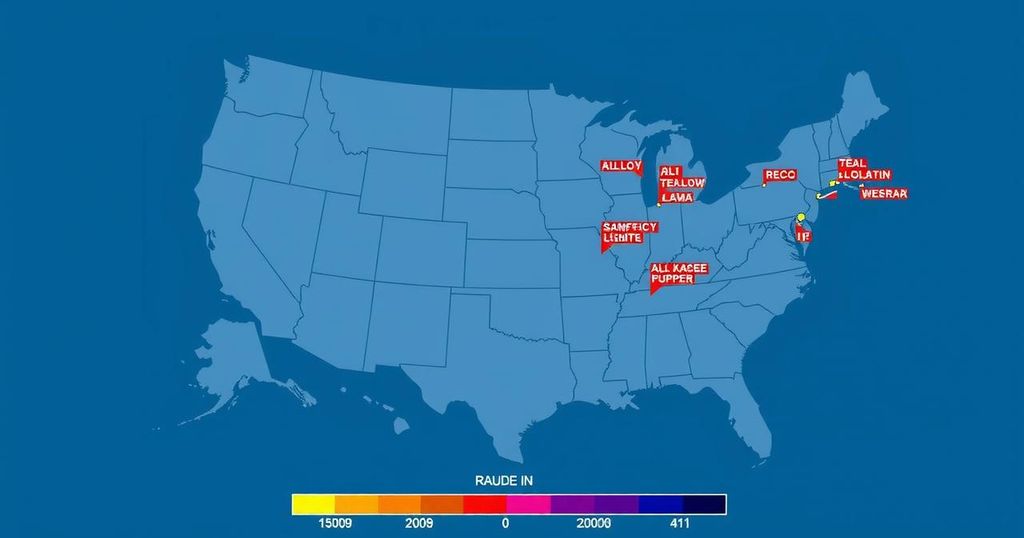Puerto Rican Voters’ Potential Impact on Trump’s Campaign Ahead of Election
The U.S. election campaign heads into a critical phase, with Donald Trump’s rally marred by offensive remarks about Puerto Rico, potentially alienating this important voter group. The incident could lead to a significant backlash from Puerto Ricans, traditionally inclined to support Democrats, particularly affecting key swing states where outcomes are finely balanced.
As the United States election campaign enters its final week, the competition between candidates remains fiercely close, prompting speculation that the outcome could hinge on unforeseen factors. Recently, Donald Trump’s campaign appears to have encountered a self-inflicted “October surprise”—a crisis that could significantly diminish his prospects as Election Day approaches. During his high-profile rally at Madison Square Garden in New York City on October 27, a comedian’s incendiary comments regarding Puerto Rico sparked outrage within the Puerto Rican community and beyond, potentially endangering Trump’s support among this vital demographic. The comedian’s offensive remarks, in which he referred to Puerto Rico as an “island of garbage,” ignited condemnation from various political circles and mobilized support for the rival Harris-Walz campaign. This incident underscores a critical point in strategic electoral considerations; offending a significant minority demographic at such a crucial juncture could have profound implications for the election. The electoral landscape of the United States is heavily influenced by the distribution of voters across pivotal swing states—namely Arizona, Georgia, Michigan, Nevada, North Carolina, Pennsylvania, and Wisconsin. Historically, elections have been decided by narrow margins in these states. For instance, in 2020, Joe Biden secured victory with an average margin of less than half a percentage point in these crucial battlegrounds. Puerto Rico, designated as an “unincorporated territory,” lacks electoral college representation despite its population of U.S. citizens. Consequently, Puerto Ricans can participate in elections only if they reside on the mainland—Inevitably, this makes their voting behavior vital to outcomes in swing states. Historical patterns indicate that Puerto Ricans have typically aligned with Democratic candidates; however, their voter turnout has fluctuated, prompting both parties to devise strategies aimed at courting this population. The demographic significance of Puerto Ricans is particularly salient in states like Pennsylvania, where they constitute a sizable community. Their voting decisions can influence the tight margins necessary for either party to secure victory. Following the comedian’s derogatory comments, prominent figures such as Bad Bunny, Ricky Martin, and Jennifer Lopez publicly endorsed the Harris-Walz campaign, illustrating the galvanization of support against Trump. As noted by Bad Bunny, the focus was directed at criticizing Trump’s inadequate response to the hurricanes that devastated Puerto Rico in 2017, reinforcing the emotional appeal among the Puerto Rican electorate. With the possibility of a resultant backlash against Trump’s campaign, Puerto Rico—a seemingly distant locale—holds the potential to become a decisive factor in the upcoming election’s outcome.
The dynamics of the U.S. electoral process reveal that swing states significantly influence presidential elections, making the role of various demographic groups, including Puerto Ricans, pivotal. Puerto Rico’s unique status as an unincorporated territory allows for its citizens to visit and reside in the U.S. but limits their ability to vote in federal elections unless they live on the mainland. This has shaped a unique political landscape whereby the sentiments and voting patterns of Puerto Ricans living in swing states could influence tight electoral outcomes. The recent incident involving derogatory remarks about Puerto Rico highlights the potential backlash that can arise from insensitivity towards minority communities during elections.
The incident at Trump’s rally exemplifies how a misstep can resonate deeply within significant voter populations, particularly among Puerto Ricans who possess a strong historical connection to the Democratic Party. Given their demographic distribution in key states like Pennsylvania, Puerto Ricans could play a crucial role in influencing the election’s outcome. As voter sentiment shifts in response to recent remarks and endorsements for the Harris-Walz campaign flourish, it is evident that Puerto Rican voters may indeed deliver an unanticipated electoral shift that could tip the balance away from Trump.
Original Source: theconversation.com




Post Comment